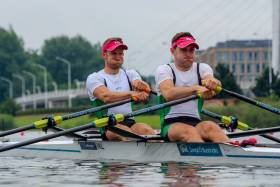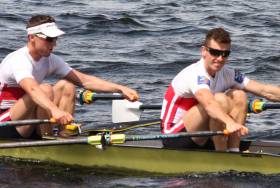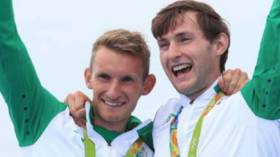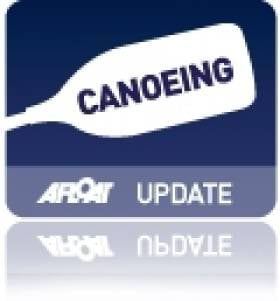Displaying items by tag: Belgrade
#Rowing: A mini-storm which damaged the starting pontoon caused the abandonment of Friday's afternoon session of the World Cup regatta in Belgrade. Mark O’Donovan and Shane O’Driscoll had been set to compete in the repechage of the men’s pair. This race has now been scrapped. Poland, for medical reasons, and Ireland were allowed to withdraw fom the draw. The men’s pair semi-finals will go ahead on Saturday, with the two crews which did not qualify directly allowed to row in the semi-finals.
There will be a race for lanes in the lightweight men’s pair at 9.06 Irish time on Saturday. The final is set for 9.10 Irish time on Sunday.
#Rowing: Paul and Gary O’Donovan won their heat and qualified directly for the A/B Semi-Finals at the World Cup Regatta in Belgrade this morning. As they often do, the UCD/Skibbereen duo won it in a sprint finish, overtaking the Czech Republic coming up to the line to win by six hundredths of a second. The Czechs and the Netherlands One had disputed the lead through the race, but the O’Donovans tracked them and drew on their remarkable finishing speed to win in six minutes 29.03 seconds.
Peter Chambers and Will Fletcher of Britain won the second heat in a time of six minutes 35.22 seconds.
World Cup Regatta, Belgrade Serbia, Day One (Selected Results; Irish interest)
Men
Pair – Heat Two (First Three to A/B Semi-Finals; rest to Repechage): 1 Britain 6:42.81, Netherlands 6:46.34, 3 Spain 6:50.69; 4 Ireland (M O’Donovan, S O’Driscoll) 6:53.50.
Lightweight Double Sculls – Heat Three (First Two to A/B Semi-Finals; rest to Repechage): 1 Ireland (G O’Donovan, P O’Donovan) 6:29.03, 2 Czech Republic 6:29.09; 3 Netherlands One 6:38.69
Heat Two: 1 Britain (P Chambers, W Fletcher) 6:35.22.
Women
Single Sculls – Heat Two (Winner to A Final; rest to Repechage): 1 Austria (M Lobnig) 7:49.47; 2 Belarus (E Karsten) 7:51.74, 3 Ireland (S Puspure) 7:53.20.
Lightweight Single Sculls – Heat Two (First Two to A Final; rest to Repechage): 1 Ireland (D Walsh) 8:07.51, 2 Poland (J Dorociak) 8:08.22; 3 Switzerland Two 8:11.65.
Puspure Set for Repechage at World Cup Regatta
#Rowing: Ireland’s Sanita Puspure finished third in her heat of the women’s single sculls at the World Cup Regatta in Belgrade today. The single qualifying place for the A Final was taken by Magdalena Lobnig of Austria, who held off the challenge of Ekaterina Karsten of Belarus. Puspure finished a clear third and will go on to a repechage with Karsten.
Jeanine Gmelin of Switzerland won the other heat convincingly.
World Cup Regatta, Belgrade Serbia, Day One (Selected Results; Irish interest)
Men
Pair – Heat Two (First Three to A/B Semi-Finals; rest to Repechage): 1 Britain 6:42.81, Netherlands 6:46.34, 3 Spain 6:50.69; 4 Ireland (M O’Donovan, S O’Driscoll) 6:53.50.
Women
Single Sculls – Heat Two (Winner to A Final; rest to Repechage): 1 Austria (M Lobnig) 7:49.47; 2 Belarus (E Karsten) 7:51.74, 3 Ireland (S Puspure) 7:53.20.
Lightweight Single Sculls – Heat Two (First Two to A Final; rest to Repechage): 1 Ireland (D Walsh) 8:07.51, 2 Poland (J Dorociak) 8:08.22; 3 Switzerland Two 8:11.65
#Rowing: Shane O’Driscoll and Mark O’Donovan finished fast but could not nail down a place in the top three in their heat of the men’s pair at the World Cup Regatta in Belgrade this morning. The Ireland lightweight pair competed in this more difficult event to up their competitive programme. Three crews of the four qualified directly for the semi-finals and Ireland stayed close to the top three for much of the race. Coming up to the line Britain, the Netherlands and Spain had the places collared, despite a good sprint by O’Driscoll and O’Donovan.
World Cup Regatta, Belgrade Serbia, Day One (Selected Results; Irish interest)
Men
Pair – Heat Two (First Three to A/B Semi-Finals; rest to Repechage): 1 Britain 6:42.81, Netherlands 6:46.34, 3 Spain 6:50.69; 4 Ireland (M O’Donovan, S O’Driscoll) 6:53.50.
Women
Lightweight Single Sculls – Heat Two (First Two to A Final; rest to Repechage): 1 Ireland (D Walsh) 8:07.51, 2 Poland (J Dorociak) 8:08.22;
3 Switzerland Two 8:11.65
O'Donovans Back in Action at World Cup Regatta
#Rowing: The 2017 World Rowing Cup series starts in Belgrade, Serbia tomorrow (Friday), running until Sunday. The regatta has attracted rowers from 26 nations and ranking among the medal prospects are athletes who won medals at the Rio 2016 Olympic Games. Ireland’s O’Donovan brothers, Paul and Gary, are back together for 2017 following their Olympic silver medal performance in the lightweight men’s double sculls, with their most notable competition being two of Great Britain’s most experienced lightweight rowers – Peter Chambers and Will Fletcher.
Shane O’ Driscoll and Mark O’Donovan will race in the men’s pair, in both the lightweight and heavyweight categories. Two-time Olympian Sanita Puspure will once again compete in the women’s single sculls, while Denise Walsh will feature in the lightweight equivalent. Puspure will come up against frequent opponent and fellow Rio Olympian, Belarussian Ekaterina Karsten. Puspure lost out to Karsten in the quarter-finals in Rio and went on to finish five positions back from her, in 13th place.
This is the first of three World Cup events in 2017. The season opener is generally an opportunity for teams to experiment with athletes and crews and see which combinations may work for the season ahead. In this post-Olympic year, it will be particularly interesting to see what the opposition holds due to retirees, new athletes/combinations and new talent emerging.
Friday’s start times are as follows (Irish times/all heats):
Lightweight Women’s Single Scull
09:05 – Denise Walsh (Skibbereen RC)
Men’s Pair
09:30 – Mark O’ Donovan (Skibbereen RC)/Shane O’ Driscoll (Skibbereen RC)
Women’s Single Scull
10:20 – Sanita Puspure
Lightweight Men’s Double Sculls
10:50 – Gary O’ Donovan (Skibbereen RC)/Paul O’ Donovan (UCD BC)
Big Weekend for Ireland's Canoeists in Balkans
Eoin Rheinisch made a good start in the K1 qualification round at the Canoe Slalom World Cup in Slovenia.
The Kildare native - who is recovering from a shoulder operation - finished 10th in the heats, qualifying for yesterday's semi-finals where he finished in 28th place.
The Irish Times reports that he described the performance as encouraging.
“I enjoyed myself today and that was my goal,” he said.
In other action from Slovenia, Hannah Craig failed make the semi-final in the women’s K1, while Patrick Hynes and Ciaran Heurteau missed out in the men’s K1.
Meanwhile in Serbia, Salmon Leap's Jenny Egan set a new Irish women's record of 1m 55.9 sec in the 500m semis at the European Sprint Canoe Championships in Belgrade, the Evening Herald reports.
She went on to finish ninth in both the 5,000m final annd 200m B final.
Fellow Salmon Leap member Barry Watkins placed fourth in the 500m B final and eighth in the 1,000m B final.
































































